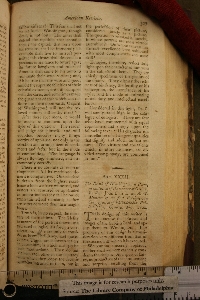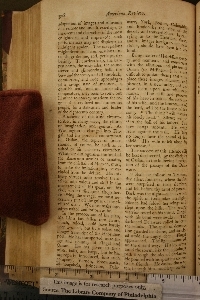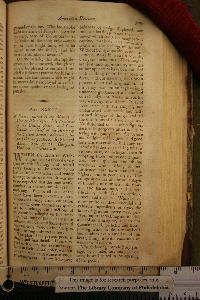 ―307― ―307―
Art. XXXII.
The Death of Washington, a Poem,
in imitation of the manner of Ossian.
By Rev. John Blair Linn, A. M.
Minister of the first Presbyterian
Congregation of Philadelphia. Phi-
ladelphia. Ormrod. 8vo. 1800.
THE design of this writer is
to borrow the phrases and
images of the Scotish Bard, and ap-
ply them to Washington. The
propriety of this design is a consi-
deration very different from that of
the success with which it is executed.
We cannot sincerely applaud,
neither shall we very earnestly con-
demn the design. As a sport of fan-
cy, as productive of that amusement
and surprise, resulting from the
 ―308― ―308―
adaptation of images and allusions
of a remote and uncultivated age, to
the events and characters of the most
enlightened and improved; such
performances may not displease an
indulgent reader. The scrupulous
might deem such combinations un-
couth, grotesque, and, perhaps, de-
basing. The artless harp, the bar-
ren heath, the misty isles, the round
tower and glimmering hall, the
bow and the spear, and all the bleak,
comfortless, and rude appendages
of a savage state of manners, a
churlish soil, and an unfriendly
temperature, may seem to some but
ill suited to convey or adorn the re-
grets of a civilized and numerous
people, for a statesman and leader
of the eighteenth century.
A scheme of this kind circum-
scribes, in many ways, the efforts
of imagination and genius. As
Washington is changed into Fin-
gal, and his poet is a countryman
of Ossian, the topics of praise
should, of course, be such as is
suited to his visionary character.
Whatever distinguishes the head of
the American armies or senates,
from the chieftain of Morven, must,
to make the imitation just, be ex-
cluded from the picture. His mi-
litary virtues must resolve them-
selves into valour and skill in the
management of his spear, and his
civil virtues disappear altogether.
In acting the savage, we must ne-
cessarily put off the guise of the ci-
vilized man. We must make our-
selves naked and forlorn as he.
In the prosecution of his plan,
Mr. Linn has fallen into errors,
which, indeed, could have hardly
been avoided, but by a naked and
meagre transcript of the Hebridian
poet. He has transported us to the
age and country of Fingal and
Ossian. He has given us their
mists, halls, and harps, but he has
improperly introduced, into such
company, Vernon, Potowmack,
Monongahela, Princeton, Dela-
ware, York, Boston, Columbia,
and Braddock; the tribes of the
desert, and towered cities. In car-
rying us to the Hebrides, these,
and all images foreign to our new
abode, should have been left be-
hind.
Being master of Hebridian scene-
ry and manners, and conversant
with the allusions and phrases of
Ossian (or M'Pherson), it is not
difficult to imitate them; that is, to
place these images, allusions, and
phrases, in a new order, and be-
stow them upon men with new
names. The skill and prowess
of his hero in battle, the suspense
of his wife, and the lamentation of
the bard, will be the theme of his
song. “The thistle” will “shake
his lonely head.” Silence will be
“in the hall of his fathers. His
bow hangs unbent. His spear
leans against the wall. His foes
no longer hear the sound of his
shield. His wife is left alone in
her sorrow.”
The success of this attempt will
be best discovered, by the disciples
of Ossian, in the following descrip-
tion of the passage of the Dela-
ware.
“Shall he follow to Trenton,
thy silent footsteps, where the foe
were surprised in their slumber,
and fell before thy arms of power:
Dark was the night—such as when
the spirit of Loda takes his flight.
Silence had folded her wings and
slept upon the hills. The weary
warrior rested on his shield. Fingal
with his band were awake. The
darkened Delaware rolled beneath
the winds. The spirit of destruc-
tion guarded his shores, and shriek-
ed amid the angry deep. Fingal
approached. The light glimmered
on the distant way. His joy arose
amid the storm, like the lightning's
path through the sky of darkness.
He pointed with his spear the course
to his friends. He dashed the wa-
ters beneath him—and leapt on the
 ―309― ―309―
ground of the foe. The foe awoke
amid the arms of Fingal——Strike
the harp, sons of Columbia!—let
the voice of the song arise–such
as the hero might hear, while he
leaned upon his shield, and his
warriors slumbered around.”
On the whole, this attempt de-
serves to be approved, though we
should be pleased to see Mr. Linn
select a different pattern for his imi-
tation. He has talents which might
be successfully employed in a man-
ner more conducive to a lasting re-
putation.
|